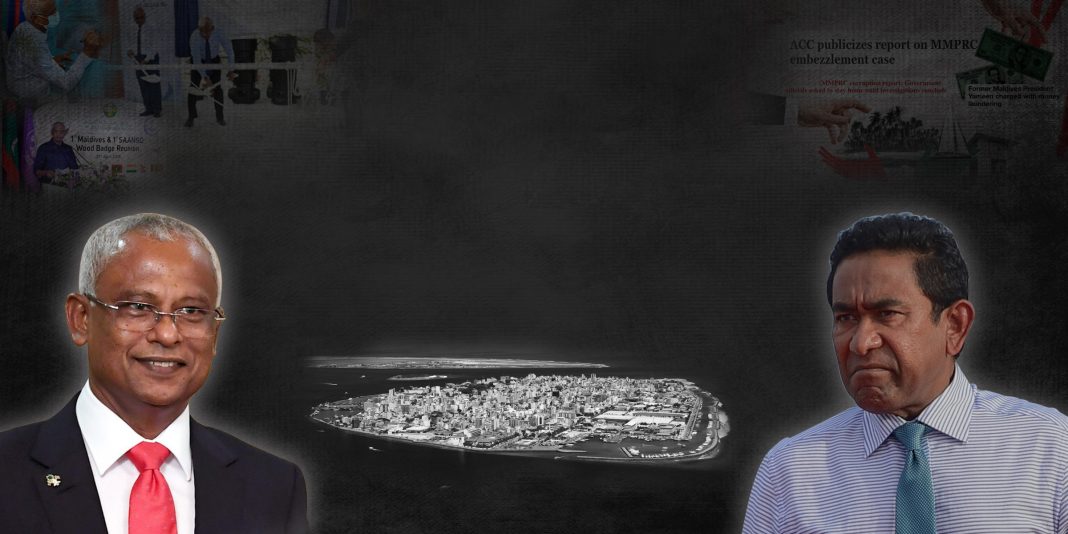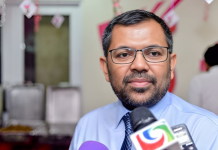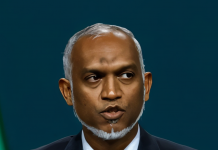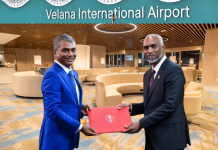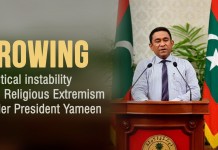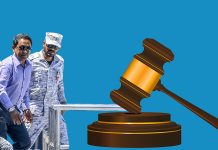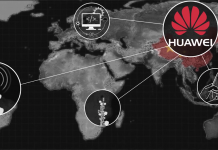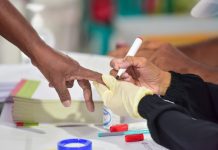Maldives rejoiced when President Ibu Mohamed Solih won the presidential election held in the year 2018. With the win of Mr Solih’s Maldivian Democratic Party it looked like this could bring the country back to the democratic path. The first 100 days after he came in power were very crucial and important, not only for his party but for the people of Maldives who were in desperate need for change.
President Solih’s determined certain goals to be achieved within his first 100 days of his government. These goals included development in the fields of education, health care, judicial reform, foreign relations and economy. His administration is the first to properly address the threats of extremism. A rise in extremism was reported following the 2004 tsunami as terrorist groups such as Al-Qaeda were escorted into the country. Despite these media reports, no previous government has publicly spoken about terrorist threats against the country.
As in comparison to when Yameen was the head of the country, denizens could finally see some proper functioning of laws and human rights being reformed into the country. It was during Yameen’s administration that the attack on human rights were at peak.
Exploitation of Human Rights: Extremists ideology, including some gangs linked to prominent politicians, harassed and attacked media and civil society groups. They specifically targeted people who criticized the Yameen’s government. His government was also questioned by the public because it made no progress in investing the abduction case of journalist Ahmed Rilan, who was last seen in Aug of 2014, or the murder case of Yameen Rasheed, a blogger and activist who was stabbed to death in 2017. In 2018, Rajje TV, a popular news network, said that it was discontinuing its regular broadcast because of continued harassment and threat. Journalists were arrested after anti-govt protests and some even reported threats by criminal gangs which was assumed to have been hired by ruling party politicians. Many broadcasting channels and newspapers were discontinued during his tenure because of his supression in free press.
Controversial law: He passed the very controversial defamation bill on Aug 2016. This bill stated that under the law, defamation is a criminal offence, which further suffocated the right exercised by the journalists. Yameen’s tenure also saw the jailing of many political figures and two Supreme Court judges, former prosecutor general and a former police commissioner.
Women rights violation: Women rights were violated the most during his term. In jan 2018, a women’s right organization, Uthema, denounced the government for failing to carry out investigations into hundreds of sexual assault. Some of the cases alleged offenders included ruling party officials.
People’s trust in the government: started diminishing the moment these issues surfaced but they could hardly do anything about it. In 2014, a government audit found that millions of dollars in tourism revenue had been diverted to private accounts belonging to Yameen’s vice president and others. The then president denied wrongdoing and jailed the vice president. The auditor lost his job and went into exile. Dr Jameel was his first Vice President of the Maldives serving for two years since 2013, until the parliament voted to dismiss him from his position. The impeachment was orchestrated by the then powerful Tourism Minister Ahmed Adeeb who succeeded the position later on but was charged with embezzlement and money laundering. On June 2016, Abdulla Jihad succeeded Adeeba and became the third appointed VP in Yameen’s five year term.
All these disappearance, murder and people being send to exile and being jailed were all too frequent to make it seem just like a mere coincidence.
Change in progress: The same when President Solih came to power, first-most discriminatory laws were reviewed, political prisoners were released, and exiled politicians began to return to the country. On Nov 2018, President Solih established a commission to investigate both the cases related to Rilwan and Yameen Rasheed and some closure were finally found. Freedom of expression improved, with a more permissive environment for civil society, media, and the opposition. Parliament passed a number of legislative reforms that further embedded democratic principles. Acknowledging Solih’s effort in bringing change, especially in child rights through the Juvenile Justice Act and Child Protection Act- raised the age of consent for marriage to 18, and abolished the death penalty for crimes committed by those below the age of 18.
While women made up half of the civil service, they were not included much in senior positions. In September 2019, parliament approved the appointment of the first 2 female Supreme Court justices. In December, the government reserved one third of council seats for women in the local elections for April 2020. Progress in the area of free press could be seen in the number of ranks Maldives jumped up in World Press Freedom Index. Maldives rose 22 places to rank 98 in the annual Reporters Without Borders. Maldives is also a member of the Media Freedom Coalition. President Solih ratified the bill to repeal the Freedom of Speech and Defamation Act on 22 November 2018
The government also sought to reform prisons in Maldives and vowed to end torture and inhumane treatment, following the reported abuse of 6 inmates at Maafushi prison.
International Relation: Maldives participates in a variety of international organizations. It joined the UN in 1965. Maldives falls within India’s sphere of influence and has also received military assistance from India. When Yameen came to power, he severed ties with India and distant himself. He was naturally hostile to India and was more open towards the idea of welcoming China with arms wide open. One of his first act was to terminate a contract granted to the Indian company GMR by the Nasheed government for upgrades at the Male airport. Instead the contract went to a Chinese firm. Number of projects were undertaken with China that were bought at an “inflated price”. FTA was signed which was also a big concern for the country.
Yameen’s International Allies: In addition to China, he also courted Pakistan and Saudi Arabia and parted ways with groupings like the Commonwealth in 2016 because of the mounting pressure from the 53 nation group for corruption and deteriorating human rights. He also included imposition of restrictions on work visas for Indians. Basically, his foreign policy had isolated the Maldives. Maldives and Saudi Arabia also experienced good cordial relationship during his tenure. During his regime, Yameen barely attended any assembly and rarely made any visits to foreign countries but several visits were made to Saudi, resulting to the Saudis establishing embassy in Maldives in 2015.
People of Maldives held protest against this growing ties when speculations of plans broke out that Yameen was trying to sell islands at Faafu Atoll to the Saudi Royals. Government critics worried that Saudi influence will foster extremists in the Maldives, where militancy has been on the rise.
Illegal dealing of islands: A set of senior officials in the Maldives, with the help President Abdulla Yameen, leased many islands through corrupt deals, while keeping tens of millions of dollars for themselves. Reporters gathered details on over 50 islands that were leased out via the scam. A 2016 audit found that state losses amounted to nearly $80 million. It also found that some investors got islands for millions of dollars less than what they would have paid following a regular process.
Feydhoo Finolhu: A undisclosed Chinese company received a 50 year lease for a bargain of $4 million. The island being very close to the capital, Male would be well positioned to monitor traffic to and fro from the international airport.Kunaavashi, another island nearby was leased for 50 years.
Regaining the trust back: Ibrahim Mohamed Solih, who pledged to restore ties with Qatar during his electoral campaign, came true to his words and the decision was publicly announced in Jan 2020 to reinstate full diplomatic relations with Qatar, nearly three years after the island nation severed ties with the Gulf nation. Ibrahim Solih also worked on building bilateral ties with neighbouring Countries. During 2019, Maldives hosted several Commonwealth delegations. Solih’s attempt to readmit Maldives as a member of Commonwealth paid off.
The country welcomed visits by 2 UN Special Rapporteurs, the first visits by UN Special Rapporteurs since 2013. In 2019, the first UK resident Ambassador arrived in Maldives. In comparison to the previous government, the civic space has opened up since 2018.
Economy: His government disclosed little about the cost of the projects or the terms of the Chinese loans. While the opposition said that it was a mistake for the tiny nation to merge such a pact with the world’s second largest economy, many worried that singing a free trade pact will only worsened the situation than it really is. Critics in the Maldives say a China-led infrastructure boom has left the tiny country debt-ridden.
Between January to August 2018 (yameens tenure) the Maldives’ imports from China were $342 million, while its exports to China were just $265,270, according to Maldives customs data. It imported $194 million worth of goods from India, its traditional partner, during the same period, while exporting $1.8 million of products. The total estimation till date of the debt that has been amounted to China by Maldives is roughly around $3 billion which is more than a half of the country’s annual economic output. Quiet concerning for a nation whose economy is solely dependent on tourism
The challenge that is faced by Solih’s government at large is to find a sustainable solution to escape from this possible “debt-trap” that the previous administration walked in on by themselves. Also diversifying the economy beyond tourism and fishing, reforming public finance and increasing employment opportunities. His government has no doubt demonstrated greater international commitment to human rights and actively contributed to the Human Rights Council as well. Commendable changes has been made under his jurisdiction. The kind of change Maldives has long deserved and need in the future too.

